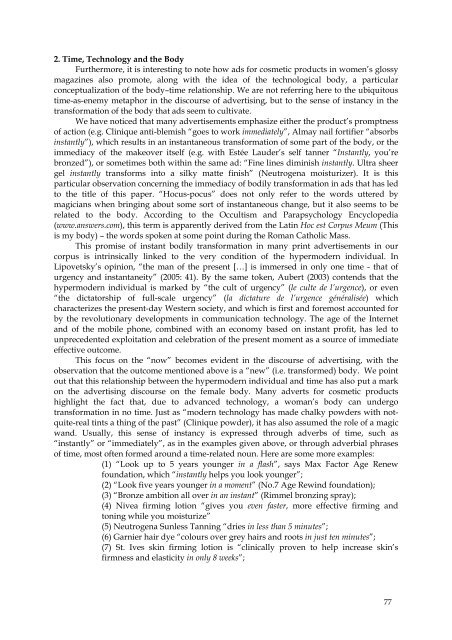Vol. 5/2009 - Facultatea de Litere
Vol. 5/2009 - Facultatea de Litere
Vol. 5/2009 - Facultatea de Litere
Create successful ePaper yourself
Turn your PDF publications into a flip-book with our unique Google optimized e-Paper software.
2. Time, Technology and the Body<br />
Furthermore, it is interesting to note how ads for cosmetic products in women’s glossy<br />
magazines also promote, along with the i<strong>de</strong>a of the technological body, a particular<br />
conceptualization of the body–time relationship. We are not referring here to the ubiquitous<br />
time-as-enemy metaphor in the discourse of advertising, but to the sense of instancy in the<br />
transformation of the body that ads seem to cultivate.<br />
We have noticed that many advertisements emphasize either the product’s promptness<br />
of action (e.g. Clinique anti-blemish “goes to work immediately”, Almay nail fortifier “absorbs<br />
instantly”), which results in an instantaneous transformation of some part of the body, or the<br />
immediacy of the makeover itself (e.g. with Estée Lau<strong>de</strong>r’s self tanner “Instantly, you’re<br />
bronzed”), or sometimes both within the same ad: “Fine lines diminish instantly. Ultra sheer<br />
gel instantly transforms into a silky matte finish” (Neutrogena moisturizer). It is this<br />
particular observation concerning the immediacy of bodily transformation in ads that has led<br />
to the title of this paper. “Hocus-pocus” does not only refer to the words uttered by<br />
magicians when bringing about some sort of instantaneous change, but it also seems to be<br />
related to the body. According to the Occultism and Parapsychology Encyclopedia<br />
(www.answers.com), this term is apparently <strong>de</strong>rived from the Latin Hoc est Corpus Meum (This<br />
is my body) – the words spoken at some point during the Roman Catholic Mass.<br />
This promise of instant bodily transformation in many print advertisements in our<br />
corpus is intrinsically linked to the very condition of the hypermo<strong>de</strong>rn individual. In<br />
Lipovetsky’s opinion, “the man of the present […] is immersed in only one time - that of<br />
urgency and instantaneity” (2005: 41). By the same token, Aubert (2003) contends that the<br />
hypermo<strong>de</strong>rn individual is marked by “the cult of urgency” (le culte <strong>de</strong> l’urgence), or even<br />
“the dictatorship of full-scale urgency” (la dictature <strong>de</strong> l’urgence généralisée) which<br />
characterizes the present-day Western society, and which is first and foremost accounted for<br />
by the revolutionary <strong>de</strong>velopments in communication technology. The age of the Internet<br />
and of the mobile phone, combined with an economy based on instant profit, has led to<br />
unprece<strong>de</strong>nted exploitation and celebration of the present moment as a source of immediate<br />
effective outcome.<br />
This focus on the “now” becomes evi<strong>de</strong>nt in the discourse of advertising, with the<br />
observation that the outcome mentioned above is a “new” (i.e. transformed) body. We point<br />
out that this relationship between the hypermo<strong>de</strong>rn individual and time has also put a mark<br />
on the advertising discourse on the female body. Many adverts for cosmetic products<br />
highlight the fact that, due to advanced technology, a woman’s body can un<strong>de</strong>rgo<br />
transformation in no time. Just as “mo<strong>de</strong>rn technology has ma<strong>de</strong> chalky pow<strong>de</strong>rs with notquite-real<br />
tints a thing of the past” (Clinique pow<strong>de</strong>r), it has also assumed the role of a magic<br />
wand. Usually, this sense of instancy is expressed through adverbs of time, such as<br />
“instantly” or “immediately”, as in the examples given above, or through adverbial phrases<br />
of time, most often formed around a time-related noun. Here are some more examples:<br />
(1) “Look up to 5 years younger in a flash”, says Max Factor Age Renew<br />
foundation, which “instantly helps you look younger”;<br />
(2) “Look five years younger in a moment” (No.7 Age Rewind foundation);<br />
(3) “Bronze ambition all over in an instant” (Rimmel bronzing spray);<br />
(4) Nivea firming lotion “gives you even faster, more effective firming and<br />
toning while you moisturize”<br />
(5) Neutrogena Sunless Tanning “dries in less than 5 minutes”;<br />
(6) Garnier hair dye “colours over grey hairs and roots in just ten minutes”;<br />
(7) St. Ives skin firming lotion is “clinically proven to help increase skin’s<br />
firmness and elasticity in only 8 weeks”;<br />
77












